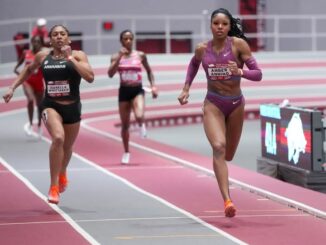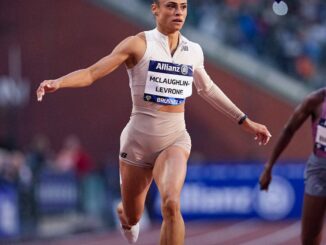
Looking out from the 61st floor, gazing over Nanjing’s towering skyline, Amber Anning could finally reflect on the ups and downs of her journey.
Just two weeks prior, she had been in tears after a lane infringement led to her disqualification at the European Indoor Championships in the Netherlands.
Three hours earlier, she had redeemed herself in spectacular fashion, becoming the first British woman to claim the 400m world indoor title.
And just moments ago, she had faced another small defeat.
“That night, me, [60m world indoor champion] Jeremiah Azu, and [60m finalist] Amy Hunt went up to the top of our hotel, played cards, and listened to some music,” she told BBC Sport, recounting how she wrapped up her World Indoors experience.
“That was our little celebration, super chill, great vibes. But I lost every single game. I was so annoyed!
“Jeremiah won two or three times, Amy won too, and I just couldn’t catch a break. But at least I won the most important thing—the 400m.”
Throughout her young career, Anning has consistently delivered when it matters most. While still a student, she earned a world bronze with Britain’s 4x400m relay team in Budapest.
In 2024, she made it to the Olympic final in Paris, breaking Christine Ohuruogu’s British record on her way to fifth place before adding two relay medals to her tally.
Now, at just 24, she is an individual world champion and one of British athletics’ brightest stars.
Her rise to the top has been nothing short of impressive.
Last summer, she dominated the British Championships, setting a new championship record and leaving competitors Laviai Nielsen and Jodie Williams far behind.
In Nanjing, on the tight curves of the indoor track, a collision with American Alexis Holmes at 175m threatened to derail her race.
Anning was forced wide, dropping back and risking losing her shot at gold.
But she stayed composed, chipped away at Holmes’ lead, powered through the final bend, and edged her rival at the finish by just three-hundredths of a second.
“In the 400m, you have time to think—it’s not like the 60m, where it’s all instinct,” she explained.
“When I got pushed, I didn’t panic. I told myself, ‘This isn’t how you imagined it, but what are you going to do now to win?’
“I had to be patient, stay focused, and time my move perfectly.
“When I rewatched it, I realized that if I had gone even a second earlier or later, I wouldn’t have won. It’s crazy how precise it all is.”
Anning’s emergence as Britain’s new 400m star carries a fitting connection to her predecessor, Christine Ohuruogu.
She was once coached by Lloyd Cowan, the same man who guided Ohuruogu’s career. Cowan passed away in January 2021 from complications related to COVID-19, a loss Anning still feels deeply.
“He was like my track dad,” she said. “He brought so much warmth, it always felt like home with him. Losing him was incredibly tough.
“I thought he’d be here to see me achieve these things, but I know he’s watching, and I know he’d be proud.
“It feels like we kept the record in the family, which means a lot.”
Anning’s mother is now part of the board of the Lloyd Cowan Bursary, alongside Ohuruogu, supporting young athletes who face financial hurdles in pursuing their dreams.
While Cowan laid the foundation for Anning’s talent, her move to the U.S. refined it further.
Encouraged by her mother, she left the UK as a teenager to train at Louisiana State University a decision that pushed her beyond her comfort zone.
“At home, I felt a little too comfortable, I needed that extra challenge,” she said.
“In the U.S., success is in your face every day.
“The competition is so intense because only a small percentage make it, and that hunger drives everyone.
“I had to adopt that mindset—to strive to be the best in the world, just like they do.”
The transition wasn’t seamless. Anning admits she lacked discipline early on at LSU and eventually transferred to the University of Arkansas, where she found both a world-class 400m training group and a quieter environment to focus.
Her victory over Holmes, the top-ranked American in the event, is proof of her growth.
And even bigger challenges could be on the horizon.
Sydney McLaughlin-Levrone, a dominant force in the 400m hurdles, ran the seventh-fastest 400m time of 2024 and may step into the flat event.
Dutch star Femke Bol, another hurdles specialist, holds the indoor world record and won gold in Glasgow last year.
If they decide to compete against her, Anning is more than ready.
“Let them come,” she said confidently. “I love competition, it pushes everyone to be better.
“That just means I need to train harder, refine my strategy, and figure out what it takes to stay at the top.”
Whether she’s looking down from the 61st floor or standing atop the podium, Amber Anning likes the view.


Be the first to comment